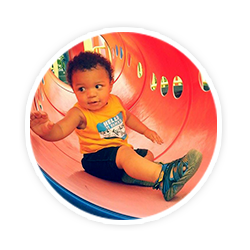Services are free!
Regardless of:
Incredible growth occurs during the first three years of a child’s life. There are many things you can do to support and nurture healthy development during this time. Below, we’ve listed some specific activities to help an 18-month-old develop and grow.
 Moving - Physical or Motor Development
Moving - Physical or Motor Development Talking - Communication and Language Development
Talking - Communication and Language Development Interacting - Social and Emotional Development
Interacting - Social and Emotional Development Thinking - Cognitive Development
Thinking - Cognitive Development
If you have concerns about a child's development and think a child might need extra help to learn and grow, don't hesitate to refer a child.
The family will be contacted by the local school district to arrange for a screening or evaluation to determine if their child is eligible for Infant and Toddler Intervention or Preschool Special Education services in Minnesota.
Services are free!
Regardless of:
